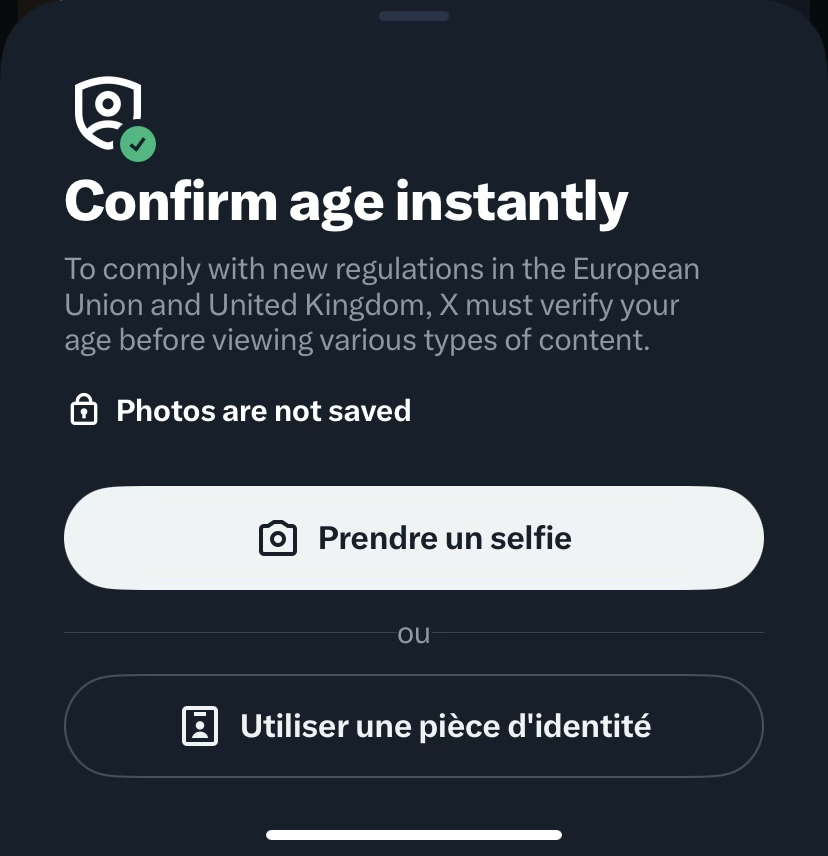A coalition of European citizens is launching a campaign aimed at repealing what they describe as the EU’s “intrusive” and “dangerous” online age verification measures.
Branded under the slogan “Stop Killing Privacy”, the movement is part of a formal European Citizens’ Initiative (ECI) to challenge controversial online safety legislation enabled through the Digital Services Act (DSA).
At the heart of their opposition is the growing use of mandatory identity checks, including uploading official documents or AI-driven biometric scans, to access everyday digital services.
Social media platforms like X have already implemented selfie-based checks, government-issued ID checks for users across the UK and the EU.
The people behind the “Stop killing privacy” campaign argued that such requirements violate privacy, create security risks, and pave the way for mass surveillance and censorship.


They argue that such requirements violate privacy, create security risks, and pave the way for mass surveillance and censorship.
Co-founder Sean Red, host of the “Twitch Tech Show”, and his team are seeking to gather representatives from at least five more EU countries to fulfil the ECI’s baseline requirement.
Under EU rules, a citizens’ initiative must have a committee of at least seven members from seven different member states, and gather one million signatures across the bloc to prompt an official review by the European Commission.
“I have been in discussion with a MEP, but we truly believe this initiative needs to be led by the citizens, especially those in tech who have come to a consensus on what we think is the right way forward in protecting our youth”, Sean Red told Brussels Signal.
Politicians from member states are also following the development of this campaign.
Philippe Latombe, a French MP and digital rights advocate, amplified the campaign on X.
Latombe wrote: “Any effective solution that avoids the need for identity checks to restrict minors’ access to content should be prioritised. Parental controls on set-top boxes and phones are an adequate and GDPR-compliant response”
The group proposes that, instead of invasive verification measures, they advocate for “opt-in parental controls integrated directly into internet boxes and mobile apps.”
They argue that this method respects user privacy while addressing child safety concerns.
Much of the group’s concern stems from observing the chaotic rollout of the UK’s Online Safety Act, which began implementation this year.
The day after the UK’s Online Safety Act came into force, protests outside hotels housing asylum seekers were effectively erased from public view for youngsters on platforms including X. https://t.co/GK819qJc9W
— Brussels Signal (@brusselssignal) July 29, 2025
The law mandates age assurance mechanisms to access content deemed harmful to minors, including social media, forums, and even streaming platforms.
“I’m in the UK right now visiting family,” Red told Brussels Signal on August 8. “In just four days, I was forced to verify my identity at least 10 times just to access services I use daily: Reddit, Discord, Spotify, and more.”
Frustrated by the frequency and privacy risks of these checks, Red said he turned to a VPN, which is a response that’s becoming increasingly common among users trying to avoid digital overreach.
“I switched to a VPN because it was simply easier and safer,” he explained.
“And we both know what the next step will be: Targeting VPNs.”
While the UK isn’t part of the EU, Red warned that the bloc is moving in the same direction, pointing to France’s internet security SREN law, which at one point even included a proposal (later rejected) to ban app stores from offering VPN apps that allow users to bypass national or EU-level restrictions.
The online privacy backlash is already measurable.
According to Proton VPN, UK-based sign-ups spiked by over 1,400 per cent following the Online Safety Act implementation.
VPNs allow users to mask their IP addresses and bypass geographic or content-based restrictions, effectively nullifying much of the law’s intended effect.
But VPNs themselves may soon be targeted. The UK’s Labour Party MPs has already floated the idea of banning VPN usage, citing fears that children could use them to circumvent age verification.
So frustrating, I did warn the last Government this would happen, but was shut down. Child protection should always be the priority. 😞 https://t.co/ZmC7TE1wwW
— Sarah Champion (@SarahChampionMP) July 28, 2025
Sean Red argues that these age-check systems not only fail to protect minors, but could actively lead children toward unregulated apps and websites that operate outside EU jurisdiction.
“While protecting young internet users is one of the most important things online. If the directives are inadequate and the implementations wrong, we are not protecting children, we’re exposing them to even more risk: Unmoderated apps and websites that operate out of the spotlight to little to no moderation,” he said.
Even seemingly benign content is being caught in the dragnet.
On August 7, a British Conservative MP’s pro-parenting video was blocked on X for featuring a baby giving an example of how this policy can lead to absurd outcomes.
Meanwhile, the “Stop Killing Privacy” campaign is finalising its website and plans to officially launch in September.
Despite being in early development, its members are optimistic that growing discontent with digital ID laws across Europe will fuel the required support.
Italy, France, Denmark, Spain, and Greece said they would pilot an online age verification app prototype developed by the European Commission, making it easier for users to prove that they are over 18. https://t.co/vKwCpMuYHw
— Brussels Signal (@brusselssignal) July 16, 2025





